Book Summary and Analysis |
History, Philosophy, Politics and Society | Popular Psychology, Personal Growth and Self-Help
A Guide to
Robert Greene’s
The 48 Laws of Power
Summary and Analysis,
Key Ideas and Facts
by I.K. Mullins
Copyright©2015 I.K. Mullins. All Rights Reserved. No part of this book may be reproduced or retransmitted in any form or by any means without the written permission of the author.
Should you have any questions, please contact us at permissions@insightfulreader.com
PART I. A SUMMARY OF THE KEY IDEAS AND FACTS IN ROBERT GREENE’S THE 48 LAWS OF POWER
Law 1: Never outshine the master
According to Greene’s First Law of Power, when you deal with people who are in positions of authority above you, you have to make them feel comfortable about their superiority. Most likely, they are aware of their imperfections and incompetence, and they become alerted when someone’s abilities and talents question their superiority. If you go too far trying to impress them and demonstrate your talents, you might end up making them feel threatened and insecure. If you make your superiors look bad, they can put their effort into making you feel miserable. Moreover, they can even destroy you. You will achieve the heights of power when you make your superiors look more brilliant than they are.
In his book, Robert Greene uses the story of King Louis XIV and his finance minister Fouquet as an example of how a person can jeopardize his or her career when ignoring the First Law of Power. In the 17th century, Nicholas Fouquet, finance minister of France, built a magnificent château on his estate and threw an extravagant party, boasting of his connections and charm. Fouquet’s actions offended his master, King Louis XIV, and the King found an excuse to get rid of Fouquet.
Galileo Galilei used the First Law of Power when he dedicated his discovery of the moons of Jupiter to the Medici family. He proposed that each moon represented one of the sons who revolved around the patriarch. Consequently, the Medici family appointed him as their official court mathematician and philosopher. This position provided Galileo with a more comfortable lifestyle and a secure income.
***
Analysis and Comments on the First Law of Power
In his book, Greene argues that it is tempting to think that interactions between superiors and their subordinates in our modern world are different from those that existed a few centuries ago. But even today, people who achieve a position of power also wish to feel secure and superior in their positions. If you make them feel threatened by your achievements and talents, they will use any opportunity to replace you with someone less talented and less threatening to them.
According to Greene, the First Law of Power can be applied in practice by using the following techniques and strategies:
- Do not have illusions about your superior’s sympathy toward you. You will lose your superior’s approval when you let yourself outshine your superior.
- Be discreet when you flatter your superior. Don’t overdo your flattery. Make your superior look more intelligent and talented than you do. Convey your ideas in a way that makes them appear as an echo to your superior’s ideas.
- Make your superior feel that you need his expertise. Downplay your own expertise. Make small mistakes that will not harm your career, but will give you an opportunity to ask for your superior’s help.
* * *
The following ideas, facts and comments go beyond Greene’s book and provide additional insight into the First Law of Power:
- People believe that a compliment is sincere when it conveys empathy and awareness. In order to find opportunities for praise, you have to understand what concerns your superior, and what your superior is trying to accomplish. A good compliment is crafted to address an area that is particularly important to your superior.
- Mark Knapp, a professor of communication at the University of Texas, points out that praise is most memorable when it uses creative words instead of common and standard words. A study conducted by researchers from the University of Texas also revealed that corporate managers, who often compliment and rarely challenge a CEO while doing the CEO personal favors, are 64 percent more likely to be appointed to a corporate board.
- In another study, Jennifer Chatman, professor of organizational behavior at the University of California at Berkeley, noticed that job seekers using ingratiating behavior were 20 percent more likely to land a job.
- According to that same study, Chatman found that job-seekers are 20 percent more likely to be hired when they use sycophantic behavior.
Even if you use sycophancy occasionally, you should remember that is not a good substitute for an integral character.
***
Law 2: Never put too much trust in friends, learn how to use enemies
According to Greene’s Second Law of Power, one must not put faith in friends. Friends are prone to envy, and they can betray you when they envy you. Friends tend to expect, ask and even demand too much from you because of your friendship. If you hire your enemy, he or she will be more loyal to you than your friends, having the need to prove himself or herself. You should be afraid of your friends more than your enemies. If you don’t have any enemies, then put an effort into making some enemies.
In his book, Robert Greene refers the story of Michael III of the Byzantine Empire and his friend, Basilius, as an example of how a person can jeopardize his or her life when ignoring the Second Law of Power. In the mid-9th century, Basilius, a horse trainer, saved Michael III’s life from the attack of a wild horse. Michael III expressed his gratitude by raising Basilius to the position of head of stables, giving him many presents and doing him many favors. But Basilius became very greedy. His desire for more wealth and power became so great that he had Michael III murdered.
On the other hand, Emperor Song used the Second Law of Power in his favor. In 959 A.D., General Zhao Kuangyin became Emperor Song. He realized that his friends in the army and in the government would destroy him, continuing a pattern of violence and bloody overthrows. To avoid such a sad fate, Emperor Song convinced his generals to retire. He spared the lives of those people who conspired against him and he won over his enemies with his generosity. As a result, the Song Dynasty ruled China for more than three centuries.
***
Analysis and Comments on the Second Law of Power
According to Greene, the Second Law of Power can be applied in practice by using the following ideas:
- Remember that your enemies keep you alert, focused and ready to act.
- You can surprise your enemies with your generosity because they do not expect it from you. If you help your enemy, he or she will be more grateful to you than your friend.
- Do not expect your friends to openly disagree with you. They will not tell you about their disagreement with you in order to avoid arguments.
- Keep friends for friendship only, and work with skilled and competent people who are not your friends. If you hire your friends, then look out for any signs of envy and ungratefulness that your friend might be concealing.
* * *
The following ideas, facts and comments go beyond Greene’s book and provide additional insight into the Second Law of Power:
- Studies reveal that the foundation for the lifetime level of a person’s trust is set by the person’s mid-twenties.
- According to a May 2005 Pew Internet and American Life Project survey, only 32 percent of respondents in the US said that most people can be trusted. About 50 percent of respondents felt that way in 1972, when the General Social Survey first included the question of trust.
- University of Maryland Professor Eric Uslaner, concludes from his studies of politics and trust that growing economic inequality should be blamed for rising distrust. He points out that in the US, trust has declined as the gap between the nation’s rich and poor grows ever wider.
- When it comes to turning your adversaries into your allies, Brian Uzzi, a professor of leadership and organizational change at the Kellogg School of Management, Northwestern University, and Shannon Dunlap, a journalist and writer based in New York City, offer a method, called the 3Rs. This method includes the following three steps:
Step 1: Redirect your rival’s negative emotions so that they are channeled away from you. You can openly redirect your rival’s negative attitude toward another opponent, or you can steer your rival to a discussion of things you and your rival have in common.
Step 2: Use reciprocity. The main idea is to give your rival something before you ask. It does not imply asking for something in return right away. If you give something and then ask for something right away, then you merely carry out a transaction instead of establishing a relationship. Choose carefully what you give and ask your rival for something that does not require much effort on his part. What you give to your rival has to fulfill his current need.
Step 3: Rely on rationality. You have to convey to your rival the expectations of the relationship that you have created with him or her. In this way, your rival will not be second-guessing your intentions while remaining in his or her adversarial state.

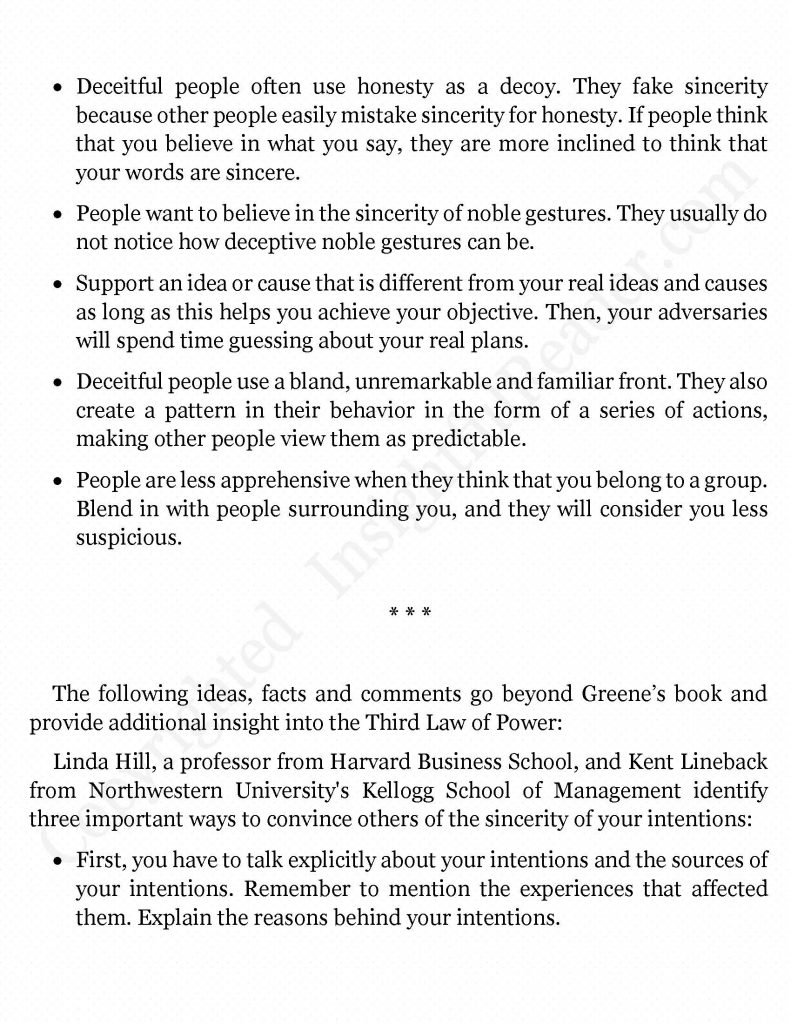


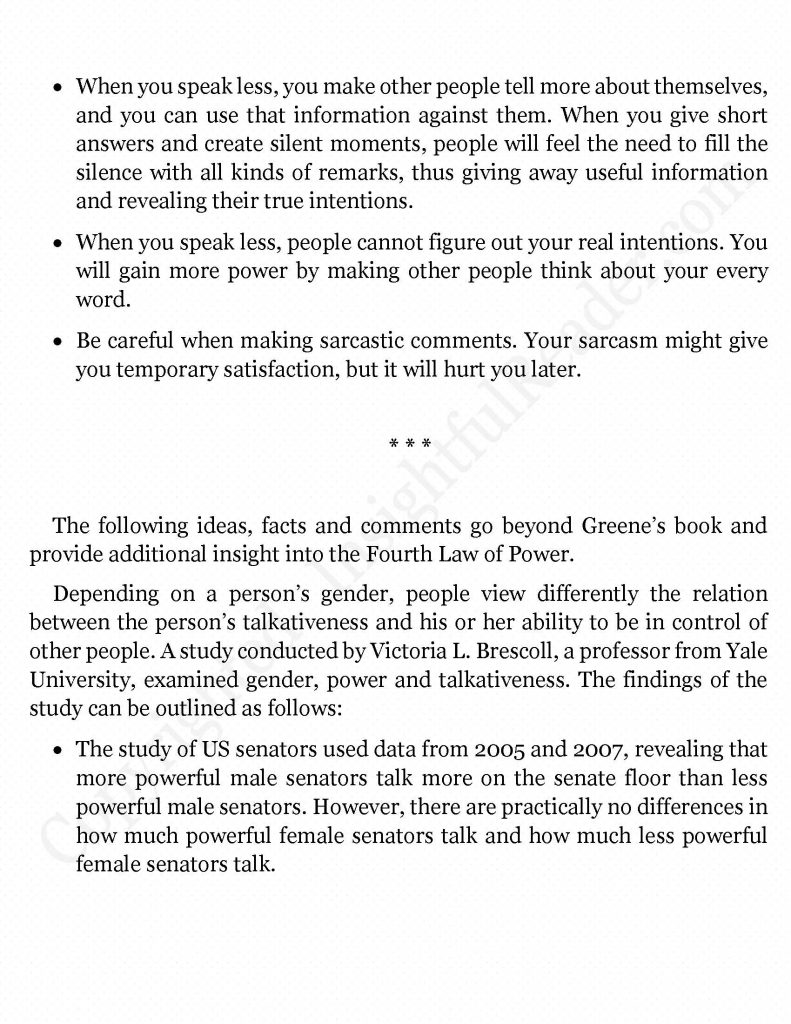

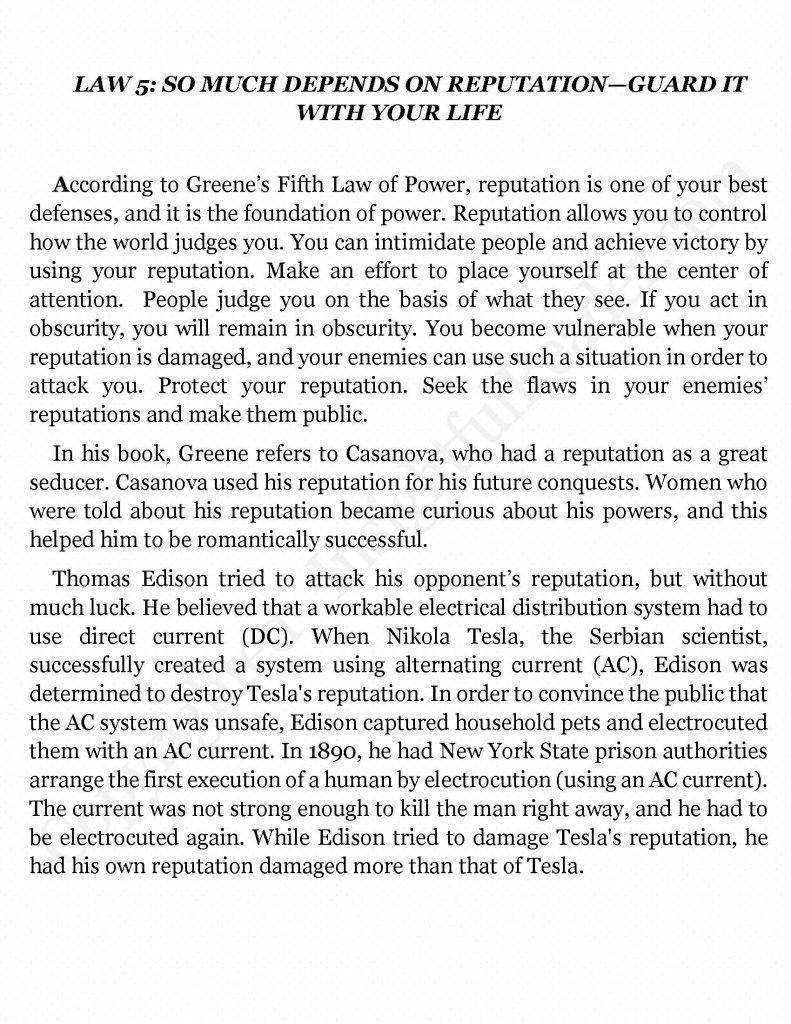


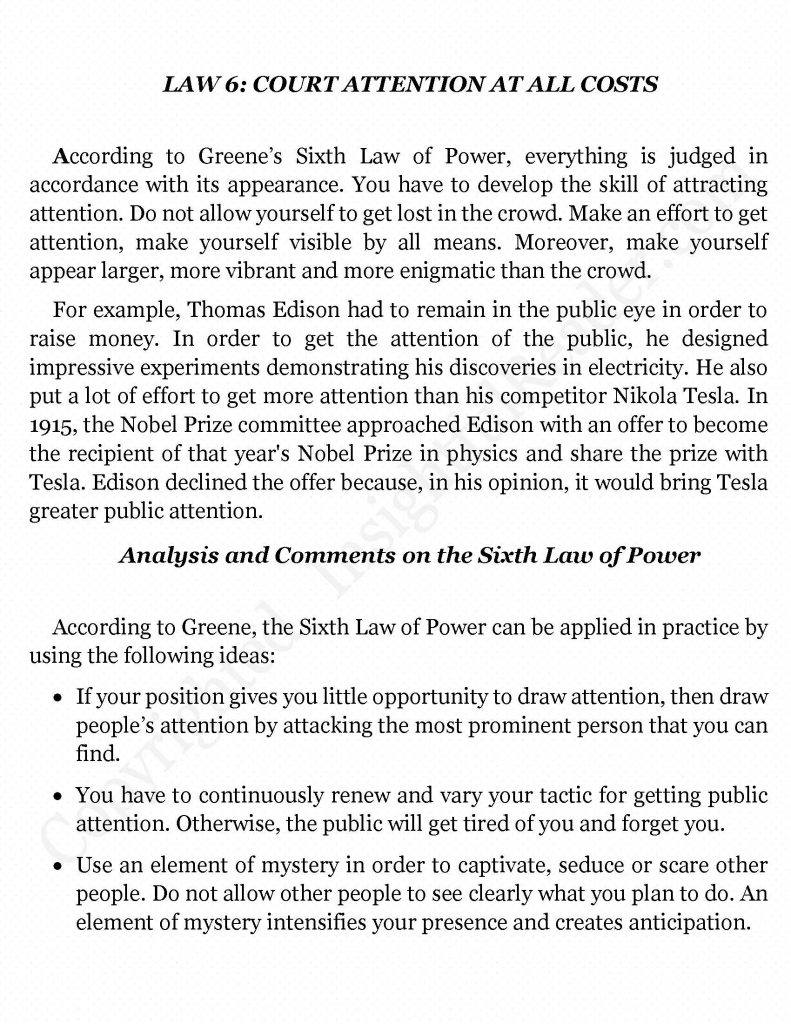

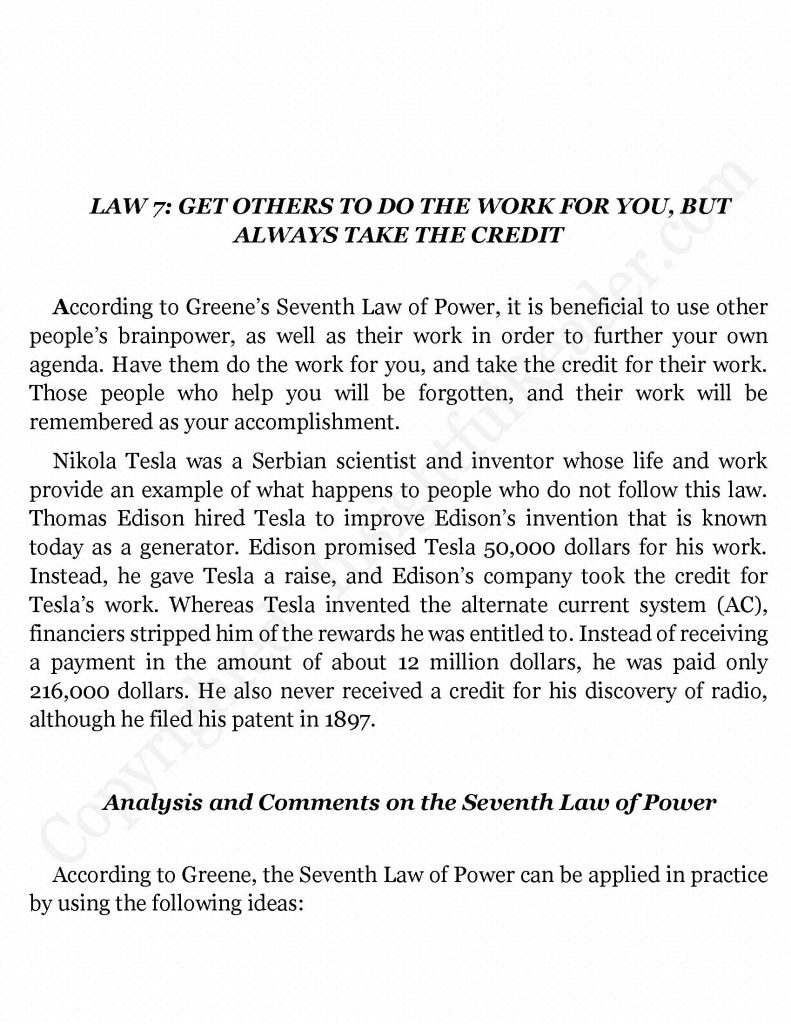


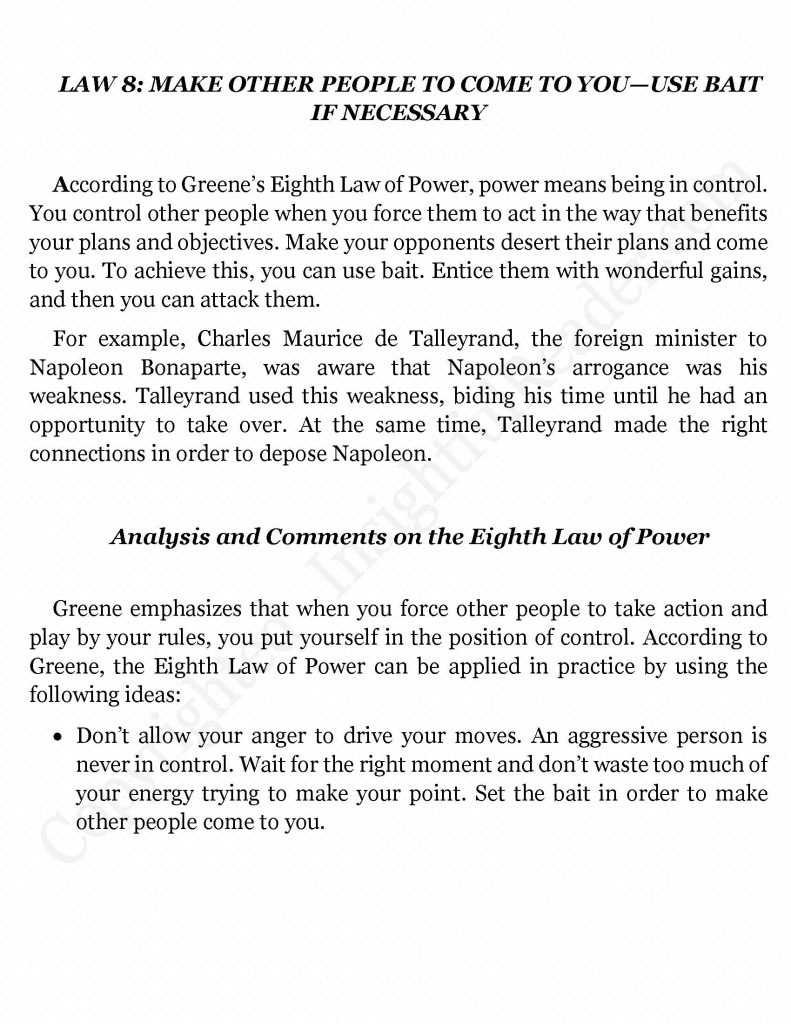


Go to Part I A Summary of Laws 9-16
Related content
Dead Wake by Eric Larson
Clinton Cash
Promoted links from around the web
Dead Wake by Eric Larson
Clinton Cash
